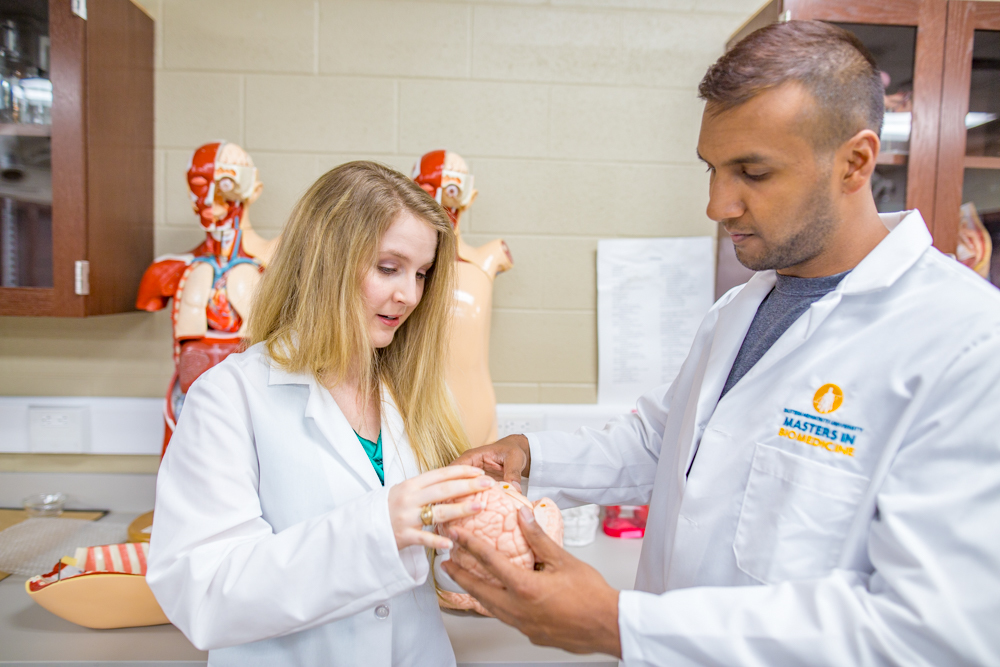For the seven Eastern Mennonite University biomedicine graduate students conducting projects this fall, master’s thesis research questions will continue to challenge and benefit them long beyond their semester deadlines.
Whitney Snider and Mehdi Hasan – and the other five in their cohort – defended their theses in early December. The seven will graduate from the master’s in biomedicine program in the spring of 2018.

Snider, a 2014 graduate of Texas A&M University, spent a month in a research lab. The purpose of the pilot study was to find common biomarkers between chronic enterocolitis in monkeys and inflammatory bowel syndrome in humans. This research will contribute to future development and testing of a therapeutic vaccine.
Snider said she made some “really great connections” for possible gap-year jobs before continuing her studies to become an orthopedic surgeon.
Hasan, a 2014 graduate of the University of Mary Washington, conducted a survey at EMU to explore the relationship of health literacy – the ability to make sense of health information – and consumer behavior as it pertains to acetaminophen, a common over-the-counter medicine that is the leading cause of acute liver failure in the United States, due to overdosage.

He found that higher health literacy scores did not significantly improve consumer behavior regarding acetaminophen – but that participants with lower health literacy scores did receive lower acetaminophen awareness scores.
“My findings allowed me to understand that those individuals that had lower health literacy had a higher probability of making a more inappropriate health decision which could lead to more negative health outcomes,” Hasan said. “There definitely needs to be a stronger focus in understanding the efficacy of health promotions.”
The value in his research for Hasan’s own career path, he said, was learning to understand the complexity of statistical analysis and “learning how to use the right tools.”
“Everything’s not black and white,” he said. “What understanding statistics will help me do is help me understand the gray area” – in part, he hopes, to improve health promotion as a family practitioner in a free clinic.
Biomed master’s program: a pathway set apart
For students applying to medical school or other professional health schools, such research projects provide “an important and unique experience that sets them apart from other applicants,” said Dr. Julia Halterman, who co-directs EMU’s biomed program with Dr. Carolyn Stauffer. “Students learn an incredible amount by taking a research project from start to finish.”
Since 2013, the master’s in biomedicine program has helped graduates prepare for careers as health professionals. The research project brings together students with faculty advisors and community mentors as they develop and conduct original research.
“We provide students with the opportunity to conduct research that is original and hypothesis-driven,” said Stauffer. “This equips each student with a unique niche that they can optimally leverage when applying for professional health schools. Original research opens doors and can make all the difference as a springboard for a student’s future.”
Additional research
Other master’s candidates, their undergraduate institutions and their research topics include:
Salma Alhusayni (Ibn Sina National College, Jedda, Saudi Arabia): “Analysis from a psychological perspective on tobacco consumption among adults living in Saudi Arabia.”
Uzair Ali (Drexel University): “The perception of Naloxone on opioid overdose in Union and Bergen Counties, New Jersey by first responders and healthcare professionals.”
Thi Do Lovo (University of Virginia): “Osteoporosis risk awareness along gender, ethnicity, and socioeconomic lines in Harrisonburg, Virginia.”
Ty Steve (James Madison University): “Analyzing single gene positive DermTech reports to determine a more effective and accurate way to discuss results with patients.”
Chang Tan (James Madison University): “HIV testing among LGBTQIA+ individuals: The impact of outness and peer openness.”

That’s great when research project brings together students with faculty advisors and community mentors .
Very useful information. Many thanks for sharing.